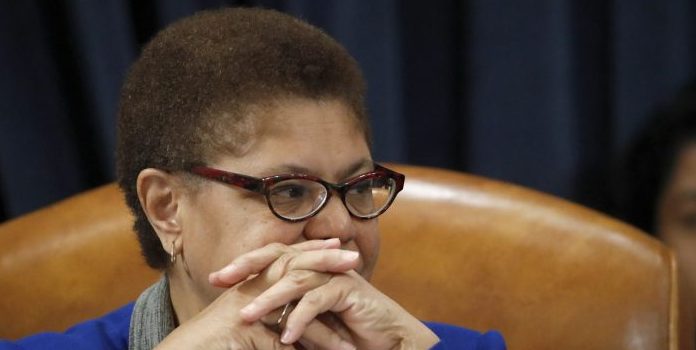(Headline USA) House Democrats hustled to pass the most ambitious effort in decades to overhaul policing nationwide, able to avoid clashing with moderates in their own party who are wary of reigniting a debate they say hurt them during last fall’s election.
The George Floyd Justice in Policing Act was approved 220-212 late Wednesday.
The sweeping legislation, which was first approved last summer but stalled in the Senate, was named in honor of Floyd, who died in a confrontation with police in Minnesota last Memorial Day, which sparked protests nationwide. The bill would ban chokeholds and “qualified immunity” for law enforcement and create national standards for policing in a bid to bolster accountability.
“My city is not an outlier, but rather an example of the inequalities our country has struggled with for centuries,” said Rep. Ilhan Omar, D-Minn., who represents the Minneapolis area near where Floyd died. She asked her colleagues if they would “have the moral courage to pursue justice and secure meaningful change?”
But Republicans, unified in opposition, argued the bill diminishes the ability of police to maintain law and order and fails to protect them from frivolous lawsuits.
“Speaker Pelosi’s so-called ‘reform’ bill eliminates qualified immunity for police officers, which will force them to purchase private insurance to simply do their jobs,” said Republican Rep. Jim Hagedorn of Minnesota. “And if it becomes law, this will result in many of our law enforcement men and women retiring early or changing careers.
“Law enforcement officers must make split second, lifesaving decisions. Turning our backs on them and defunding the police will not enhance safety on America’s streets. Instead, we must ensure police departments have the funds needed to recruit, train, and retain high-quality officers and public servants.”
Democrats say they were determined to pass the bill a second time, to combat police brutality and “institutional racism” after the deaths of Floyd, Breonna Taylor and other blacks following interactions with law enforcement — images of which were sometimes jarringly captured on video. Those killings drew a national and international outcry.
But the debate over legislation has turned into a political liability for Democrats who have promoted — or remained silent about — the cause to “defund the police.”
While Democrats used their then-larger majority to pass the police reform measure in the House last summer, it stalled in the then-Republican-controlled Senate, where GOP senators pushed an alternate plan that Democrats blocked from consideration, calling it inadequate. Democrats now control both chambers of Congress, but it seems unlikely the bill could pass the Senate without substantial changes to win GOP support.
The bill had been set for a vote Thursday, but House leaders abruptly changed the schedule to wrap up their week’s work after U.S. Capitol Police warned of threats, without evidence, of violence at the Capitol two months after the Jan. 6 siege.
Senior Democratic congressional aides said Wednesday they were eager to get the bill to the Senate, where negotiations will take longer.
“Our law enforcement officers need more funding not less,” Rep. Scott Fitzgerald, R-Wis., said during Wednesday’s debate.
The bill’s prohibitions on so-called qualified immunity, which shields law enforcement from certain lawsuits and is one of the main provision, will likely need to be negotiated in any compromise with the Senate.
Police unions and other law enforcement groups have argued that, without such legal protections, fear of lawsuits will stop people from becoming police officers.
Far-left California Rep. Karen Bass, who authored the bill, understands the challenge some House members face in supporting it.
“My colleagues, several of them, I do not make light of the difficulty they had getting reelected because of the lie around defunding the police,” Bass said.
She called provisions limiting qualified immunity and easing standards for prosecution “the only measures that hold police accountable — that will actually decrease the number of times we have to see people killed on videotape.”
Bass said she would not make concessions before the bill cleared the House. Changes would only serve to weaken it while failing to shield Democrats from the false “defund the police” narrative surrounding it, she said.
“Even if they were to vote against the bill, even if they were to have a press conference denouncing the bill, they are still going to be hit with the same lie,” Bass said of Democrats.
Bass said she’d been in contact with South Carolina Sen. Tim Scott, the only black Republican in the chamber, and was confident he would help deliver some GOP support.
Scott said this week that the legislation’s sticking points were qualified immunity and prosecutorial standards and that in both areas, “We have to protect individual officers.”
“That’s a red line for me,” Scott said, adding, “Hopefully we’ll come up with something that actually works.”
Adapted from reporting by Associated Press.

